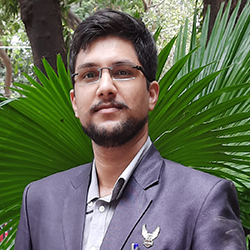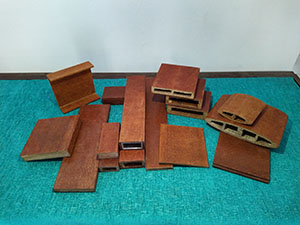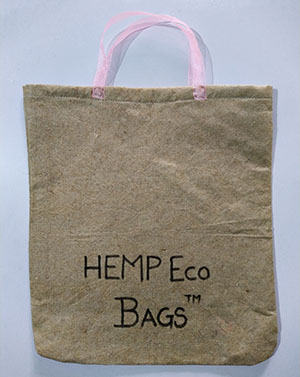
When A TV Show Created a Business
Awega Green Technologies was created to build hemp – a.k.a. ganja-based products.

Karan Sarsar
10 years ago, when Karan Sarsar was watching National Geographic, he was spellbound by the information on hemp. Says he, “they showed how car body panels could be made from hemp, and I was fascinated!” This fascination with what is also known as ganja grew, and Karan explored various uses.
What resulted was the first biodiesel blend that gave zero-emission. “I was guided by my mentor and adviser in the US – Chetan Savankar. This year in Sept the duo got a patent for the process and Karan will now receive a royalty. But the obsession with hemp continued.
Karan read about pollution caused by motorbikes and also the noise their exhaust pipes make. “I thought why not see if hemp could provide a solution. With his juniors at COEP he started developing an exhaust muffler made with hemp. “Aniket Shirole, Varun Singh, Neeraj Bagul and Kumar Murlidharan were a year younger than me in college. We used this as their fourth-year project, succeeded in making a muffler that reduced air pollution and sound better than even ARAI mandates.”
Like many young innovators, large companies often reject their product after a presentation, on grounds that they have their own R&D team. However, in 2017 Karan got a provisional patent for it. But that wasn’t enough. “There’s simply so much one can do with hemp. Why not use this plant to its full capacity?”

And opportunity knocked at his door again. HolyWood India is a company in Kolkatta that has developed jute composites, which is an alternate replacement for wood. Says Karan, “I met with the founder of HolyWood, Sunil Agarwal and his team, and suggested why not try using hemp with jute? He was amenable and after some trials, we succeeded.”
The end result was a composite that was three times stronger than traditional teak wood and had less thickness. “its strength was comparable to magnesium alloy that is generally used for the wheels of supercars.” Since he had worked with an existing manufacturer to develop this composite, there was no question of being rejected on grounds of an in-house “R&D team” but there is the law of the land that is a huge stumbling block to his business.
Says Karan, “Hemp that is derived from the same plant that gives us ganja, has several restrictions on growing them. In fact, you cannot plant ganja in your fields or even in a pot in your home.” Surely bad tidings for a business that’s built on ‘ganja’ plant? But Karan is not unduly disturbed by it. Says he, “yes, it is an obstacle for my business, but we have plans to get around this as well. It is well-known the world over that hemp can help reduce pollution, a challenge that Governments around the world are struggling with. I’m planning to get all the people who can see the benefits of hemp-based products to come together and form an association. With this, we will then lobby with the Government”
Hemp is a narcotic plant that contains THC (Tetra Hydro Cannabinol) that is the problem. “If you remove this THC, then hemp is like any other plant. THC is present in the plant when it is short. Moreover, the male plant does not contain THC. Anyway, even if we harvest it at the stage where it possesses the THC, we mulch it, so it’s in no way used for illegal purposes. So, we want that the Government should let legitimate manufacturers have access to such fields.”

Easier said than done. But that is not putting a dampener on Awega. Says Karan, “In India, only the Uttarakhand Govt allows ganja fields. Moreover, the import of hemp for industrial use is allowed. And Nepal grows hemp aplenty. And, we do not impose import duty on products from Nepal.”
And so, the magnificent hemp obsession continues. Two years ago, the Ministry of Textiles threw up a challenge to start-ups. They wanted a replacement for single-use plastic bags. Karan used the machinery at HolyWood and Rs 50,000/- to develop a material using hemp as a replacement for plastic.
“We got the first prize of Rs 3 lakhs. Our bags were made of 70% hemp and 30% jute. This material has a low GSM and also great strength. It is non-woven and uses the same machines that were being used at HolyWood.”
Karan had 35,000 bags made and distributed to different restaurants in Pune, Mumbai, Ahemdabad for viability. “They reported that one the cost was too high, and two that it needed better waterproofing. The cost of developing a 30×20 inch sheet was Rs 22/-”
Meanwhile, there was the Agri India Hackathon where one had to develop a product from waste. Awega has been shortlisted and won a Rs. 25 lakh grant from the Government, as well as incubation at the Indian Council for Agriculture Research. However, the problem of cost and waterproofing remains.
Karan worked on several materials and has identified a biodegradable coating material for waterproofing. “But for this, we need to modify the machines so that both the layers can stick together.”
This natural networker has leveraged his networks right from college mates, business associates and professors to build on his idea. And so, his team too is a result of relationships built along the way. Abha Christian who was his boss at Harley-Davidson is helping him as his CMO, Saroj Pawar is his COO, Chetan Sayankar continues as his mentor and his friend Aniket is the CTO. “I am not paying a salary to anyone yet. In fact, Ms. Christian told me that when she gets me some funding, then we can start paying salaries.”
Karan is acutely aware of the chicken and egg situation Awega is in. “I can reduce the cost when I reach 2 lakh bags a day, but to get to that number I need to reduce costs. Participating in large Government order bids can get me large orders, but that can happen only when I have a turnover of Rs 5 Crores.”
While Indian markets will move at their own pace, Karan has set his sights on Nepal, Australia and Mauritius who will be willing to pay more. “We aim to focus on exports and get volumes that will help reduce costs for the domestic market.” With this hope in his heart and hemp on his mind, Karan moves forth.
Contact us if you have a story to tell: rashmi.ghosh@tiepune.org


